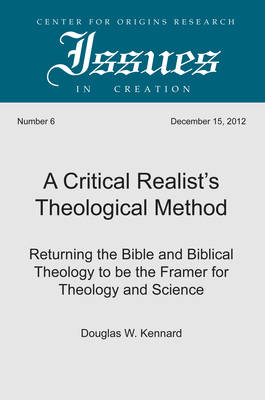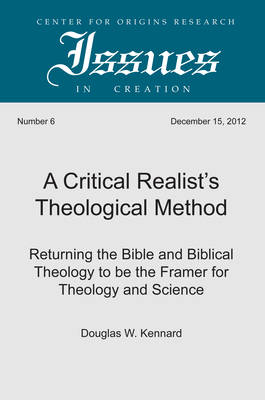
- Afhalen na 1 uur in een winkel met voorraad
- Gratis thuislevering in België vanaf € 30
- Ruim aanbod met 7 miljoen producten
- Afhalen na 1 uur in een winkel met voorraad
- Gratis thuislevering in België vanaf € 30
- Ruim aanbod met 7 miljoen producten
Zoeken
A Critical Realist's Theological Method
Returning the Bible and Biblical Theology to Be the Framer for Theology and Science
Douglas W Kennard
€ 138,95
+ 277 punten
Uitvoering
Omschrijving
A Critical Realist's Theological Method explores a systematic theology method grounded in critical realism in the wake of Alister McGrath, Imre Lakatos, Nancey Murphy, N. T. Wright, and Dale Allison. Kennard surveys philosophical and traditional theological approaches for contributions and limitations in order to set out a method for theology and science. Kennard extends this method to a Thiselton-Ricoeur hermeneutic that can fund insightful exegesis and Biblical theology in the wake of Ladd, Dunn, Vos, and Goldingay. This Biblical theology method is illustrated by wisdom literature, the traditional reef of the discipline and then developed for the contributions toward systematic theology as Gabler had originally envisioned. With contextualized Scripture sourcing most of the content for systematic theology the trajectory is shown in the subtitle Returning the Bible and Biblical Theology to be the Framer for Theology and Science. The method is exampled in exegesis of creation texts which frame possibilities for science. Likewise, Biblical theology frames a bio-ethics integration of psychology and theology setting out a transactional model for psychological recovery with University of Chicago professor Paul Holmes. A theology for peer review and work is also framed.
Specificaties
Betrokkenen
- Auteur(s):
- Uitgeverij:
Inhoud
- Aantal bladzijden:
- 456
- Taal:
- Engels
- Reeks:
Eigenschappen
- Productcode (EAN):
- 9781498265850
- Verschijningsdatum:
- 21/02/2013
- Uitvoering:
- Hardcover
- Formaat:
- Genaaid
- Afmetingen:
- 152 mm x 229 mm

Alleen bij Standaard Boekhandel
+ 277 punten op je klantenkaart van Standaard Boekhandel
Beoordelingen
We publiceren alleen reviews die voldoen aan de voorwaarden voor reviews. Bekijk onze voorwaarden voor reviews.











